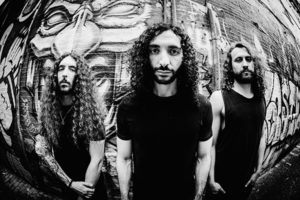By DJ Dave Hoffenberg
“I Wanna Rock” is what you’ll be saying on Saturday, Nov. 6, while at the The Howlin’ Mouse Record Store in Rutland. And My Missing Half will make sure you do. The all-ages show starts at 8 p.m. and also on the bill are: Tactiles, Fabricator and Others. This is going to be a high-energy metal show.
In a recent interview with guitarist Nick Petrino I learned about My Missing Half and Dee Snider. Joining Nick are Bijan Hennessey on vocals/guitar, Phil Wakefield on bass and Yianni Tranxidis on drums.

The metal band My Missing Half is made up of Nick Petrino, Bijan Hennessey, Phil Wakefield and Yianni Tranxidis.
The death-metal band hails from the Boston area. Petrino said, “We’re on the melodic side of death-metal. It still has the screaming type of vocals but with more melodies and some elements of classic heavy metal. Live, it’s pretty straight forward. We don’t dress anything up with theatrics. We’re old school with black t-shirts, long hair and loud guitar solos.”
Petrino and Hennessey do a lot of the harmony type guitar solos. Petrino added, “One guitar solo is cool but two at the same time is cooler.”
The band formed in 2011 and Petrino joined in 2014. They have two albums out with their latest, “Ceaseless Decay,” released in April 2020, though they started writing it in 2018. Petrino said, “It was a long time coming. There was a lot of things building up to that. We had a whole PR thing with tours scheduled for the release and then Covid hit.
“We put so much into that record and then to see the world fall apart around us right when we were trying to drop that, we were a little too distracted to give that the attention we hoped it would get. Part of me never wants to hear that record again but part of me knows it didn’t get the chance it deserved.”
They’ll be playing songs from that album, but Petrino said it’s weird to think these shows are supporting “Ceaseless Decay” since it came out so long ago. He said their thoughts now are on the future. “We’re just trying to get back on track,” Petrino said. My Missing Half has a December tour planned to some southern states like Florida, Texas, and Tennessee.
Petrino moonlights with Dee Snider, as he is the guitarist for his band. He’s always done session work and fill-in spots with friends’ bands. He built up a reputation as a dependable player.
In 2018, Snider did a thrash-metal solo album which was a new direction in his career. A couple of Connecticut guys that wrote the album were looking for a band for Snider.
Petrino said, “My name came up enough that they reached out. They called and asked if I wanted to come audition for this new project. After they told me who it was, my jaw hit the floor.”
Originally it was just supposed to be just a few shows to support the album, but then the album took off, charted really high, and became a really successful album.
“We kept getting booked. Dee was really into it and we’ve been doing it ever since,” Petrino said. The group added a live album last year and another studio album a few months ago.
Petrino treats all his shows the same, which is a great attitude to have. He might go play a few shows with Snider in some different countries to massive crowds, then fly home and play in a bar with My Missing Half to 30 people. His band mates in MMH are cool with it because they’ll play these little bar gigs and then all fly out and play a festival to some larger crowds.
Petrino said, “I think that goes a long way in terms of how we’re received. There’s a lot going on at those festivals and you can get really lost in it but I just go in, put my guitar on, plug in, play the songs we’ve been jammin’ and that’s it. If people are digging it, that’s cool. What’s important is we always try and put on as good a show as we can. Whether I’m playing to 30,000 people in Sweden or four people and a dog in South Boston, it doesn’t matter, I’m still performing just as hard. I’m just as rehearsed and prepared for the gig in terms of my performance and my delivery.”
Petrino puts so many hours every day, week and month into practicing, recording, rehearsing with the band, posting on social media, folding t-shirts, everything that goes towards these bands and these creative outlets.
He said, “So much of it really beats you down. A lot of it you don’t get paid for. It can be very stressful, but when you’re up there playing, there’s something about those minutes you’re on the stage that everything you’re doing feels so right.”




